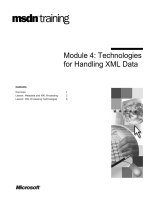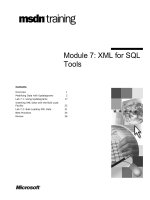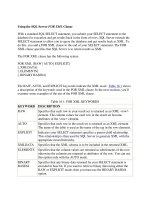XML for e-Business
Bạn đang xem bản rút gọn của tài liệu. Xem và tải ngay bản đầy đủ của tài liệu tại đây (847.72 KB, 105 trang )
Copyright CSW Informatics Ltd 2003
XML for e-Business
Eve Maler
Sun Microsystems, Inc.
Goals for this session
•
Learn about the Universal Business
Language (UBL) and its significance to, and
place in, modern e-business
•
Study UBL’s design center and underlying
model
–
A model that may be useful for many information
domains
•
Study UBL as an application of XML
–
And its lessons for other large XML undertakings
•
Take a look at some real UBL inputs and
outputs along the way
A little about me
•
I’m an XML Standards Architect in Web
Technologies and Standards at Sun
•
I co-founded the OASIS UBL Technical
Committee and formerly chaired its biggest
technical subcommittee
•
In previous lives I helped develop XML itself,
DocBook, XLink, Pipeline, and more
•
I also coordinate Sun’s interaction with
XML/web services security standards and
take part in several related standards efforts
Agenda
•
XML for e-business:
why and how?
•
EDI, ebXML
business web
services, and UBL’s
role
•
Making UBL happen
•
ebXML Core
Components
•
The UBL modeling
methodology
•
Designing the UBL
schemas
•
Resources
Thanks to Jon Bosak and others in the OASIS UBL TC for
content assistance!
Copyright CSW Informatics Ltd 2003
XML for e-Business:
Why and How?
Did you know…?
•
E-commerce essentially means electronic B2B
•
Modernizing and improving B2B can provide huge
benefits
Unreasonable goals for B2B
•
Magically enable universal
interoperability merely through “using
XML”
•
Reinvent (disrupt?) our concept of what
business means
•
Abandon existing EDI (Electronic Data
Interchange) systems
•
Commoditize the universe
•
Stop spending lots of effort on business
relationships
•
Eliminate humans from decision-making
More facts about
e-commerce
•
It’s difficult to take the people out of
business process, for reasons of:
–
Trust relationships
–
Error handling
–
Legal action
•
Business is built on the concept of
standard, legally binding documents
•
Legal intent requires meaning
•
XML alone will never give you this
Reasonable goals for B2B
•
Web-enable existing paper-based
business practices
–
Save money by eliminating re-keying
•
Preserve investment in existing systems
and allow businesses to migrate at their
own pace
•
Integrate SMEs into existing EDI-based
supply chains
•
Maintain a legally accessible audit trail
•
Incrementally enable true global market
availability
A global XML standard can
help achieve these goals
•
Lower cost of commercial software
•
Easier learning curve
–
Standardized training
–
More skilled workers
•
Lower cost of integration through reuse
of common structures
–
Universally available pool of system
integrators
•
Lower overall cost of entry
–
Thus, quicker adoption by SMEs
Enter UBL, the Universal
Business Language
•
An XML-based business language standard
•
Leverages knowledge from existing EDI and
XML B2B systems
•
Applies across all industry sectors and
domains of electronic trade
•
Modular, reusable, and extensible in XML-
aware ways
•
Non-proprietary and committed to freedom
from royalties
•
Intended to become a legally recognized
standard for international trade
UBL’s potential fit with
existing XML B2B
Electronics
manufacturer
A
A’s industry
partners
RosettaNet
Hospital B
B’s industry
partners
HL7
Chemical
manufacturer
C
C’s industry
partners
CIDX
Copyright CSW Informatics Ltd 2003
EDI, ebXML Business
Web Services, and
UBL’s Role
The traditional EDI stack
EDIFACT,
X12
Standard
messages
MIGs
Message
contextualization
Infrastructure
Payload
Packaging/
transport
VAN
Business
processes
CASE tool
Business
agreements
Ad hoc
TPA
Some EDI pressure points
•
Private networks are expensive and
require extensive point-to-point
negotiation
–
Though AS1 and AS2 mitigate this concern
•
The business process data is “soft”, not
machine-readable
•
The interchange pipeline is large, with
infinite possible subsets
•
The data for adapting to different
business contexts is also “soft”
Enter ebXML, the Electronic
Business XML initiative
•
A joint 18-month effort, concluding in
May 2001, of OASIS and UN/CEFACT
–
The work continues in several forums
today
•
Over 1000 international participants
•
The vision: a global electronic
marketplace
•
Enterprises of any size, anywhere, can
find each other electronically and
conduct business by exchanging XML
messages
The ebXML stack for
business web services
ebMS
BPSS
CPPA
Core
Components
Context
Methodology
ebXML Registry
Packaging/
transport
Business
processes
Business
agreements
Standard
messages
Message
contextualization
Discovery/
retrieval
ebXML for infrastructure is
basically ready
•
Components approved as OASIS
Standards:
–
ebXML Message Service (ebMS) V2.0
–
ebXML Registry (formerly “ebXML
Reg/Rep”) V2.0
–
ebXML Collaboration Protocol Profile and
Agreement (ebXML CPPA) V2.0
•
Business Process Schema
Specification (BPSS) work is ongoing in
UN/CEFACT
•
Many implementations and
interoperability/test events to date
ebXML for the payload is
proceeding, but conceptual
•
The ebXML Core Components
Technical Specification is at V1.90
–
Syntax neutral and ready for mapping
•
This includes the Context Methodology
work
–
Again, syntax neutral rather than syntax
bound
UBL proposes to flesh out the
ebXML stack
ebMS
BPSS
CPPA
ebXML Registry
Core Components
Context Methodology
UBL Library
UBL Context Meth
The basic requirements
•
Semantic clarity through a binding from
Core Components to a syntax
•
Choosing XML as that syntax!
•
Royalty-free IPR
•
Usable “on the cheap”
•
No ties to particular back-end
implementations
•
Urgency
•
Allow for contextualization
The special requirement for
context
•
“Standard” business objects need to be
different in different business contexts
–
Addresses in Japan and the U.S. have
different fields
–
In some industries, addresses need GPS
coordinates rather than streets
–
Invoice items for shoes need to provide
size information; for coffee, roast
information
•
These differences need to be
accommodated without sacrificing
interoperability
Copyright CSW Informatics Ltd 2003
Making UBL Happen
UBL really is
happening!
The standards venue
•
UBL is being developed in an OASIS
Technical Committee (TC)
•
OASIS offers:
–
An objective process
–
Openness of its work to public view in real
time
–
Easy and inexpensive opportunities to join
•
Jon Bosak is the chair and main
founder
•
The membership is diverse, including:
–
Users, vendors, and governments
–
XML and e-business experts









